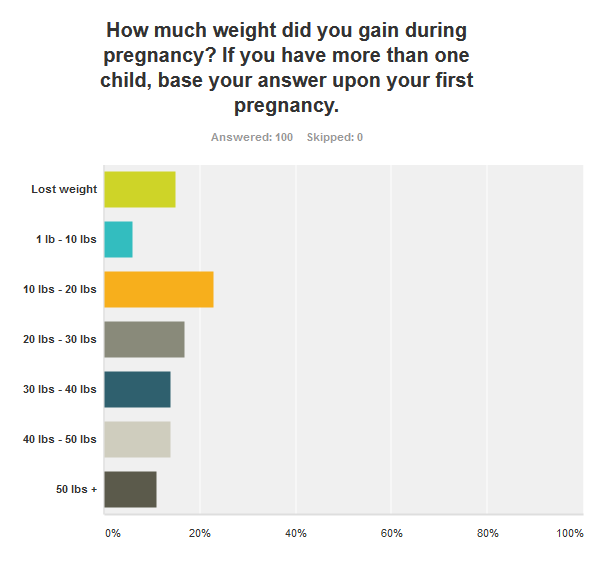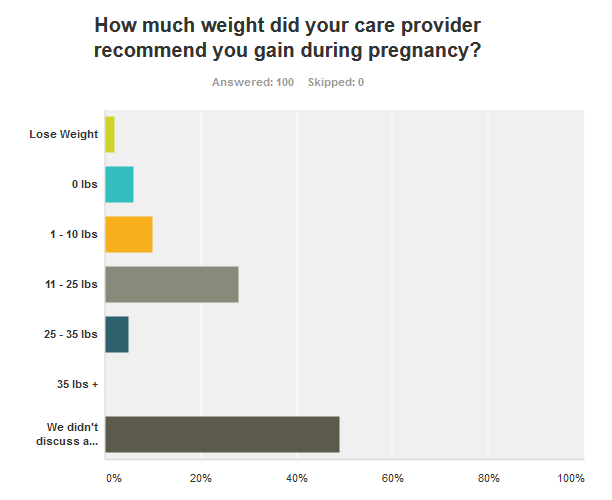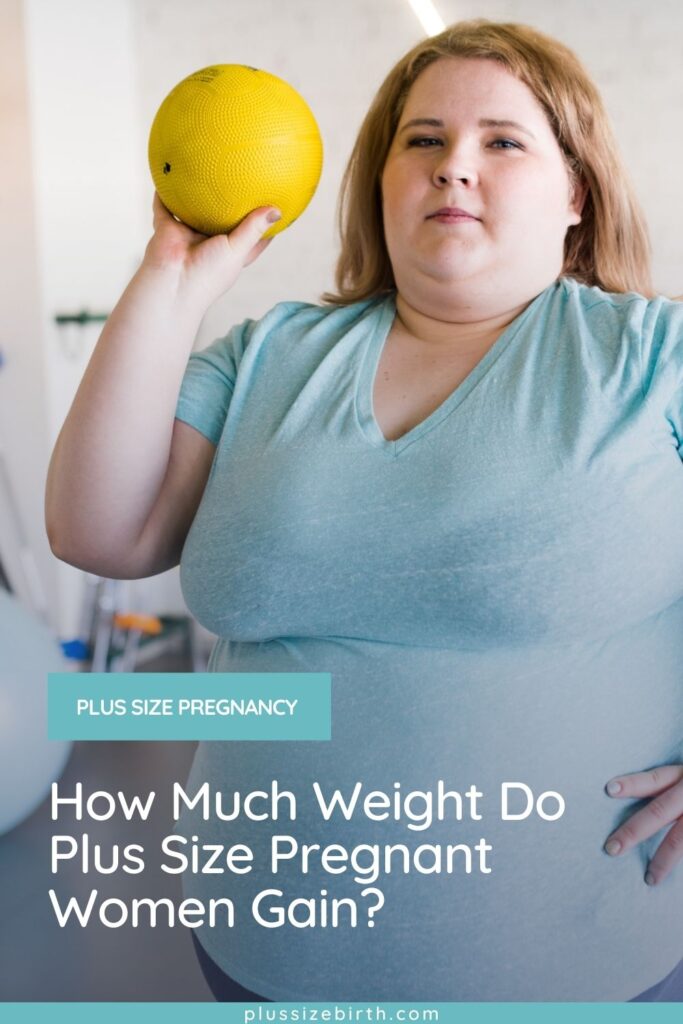You might be wondering how much weight do plus size pregnant women gain?
You could ask twenty-five women how much weight they gained during pregnancy, and they’d probably each give a different answer. And while talking about weight is never fun, this is an important conversation we need to have during pregnancy.
Weight Gain Recommendations During Pregnancy When You're Plus Size
In 2009, the Institute of Medicine (IOM) changed its guidelines for pregnancy weight gain.
“Overweight women carrying a single fetus are advised to gain a total of 15–25 lbs. during pregnancy (compared with 25–35 lbs. for normal-weight women). Obese women are advised to gain less: 11–20 lbs.”
Most often, people with a BMI over 30 are encouraged not to gain more than 15 lbs. And, it can be pretty discouraging for a plus size person to hear this limitation. It can be tempting to start dieting to prevent weight gain during pregnancy. However, dieting and restricting food isn't the answer. It never is!
If someone hasn't already worked on changing their relationship with food and practicing Intuitive Eating, pregnancy is an incredible time to start.
The American College of Obstetricians and Gynecologists also recommends that people with a BMI over 30 connect with a nutritionist during pregnancy. We highly encourage people to work with a Health At Every Size® aligned nutritionist.
It's common for plus size people who are proactive with their nutrition and physical activity not to gain a lot of weight during pregnancy. Some even lose weight gradually over time – but remember, weight loss shouldn't be a focus during pregnancy; it just might be a byproduct of healthy habits.
So, that goal of limiting weight gain to 15 lbs during pregnancy isn't as unobtainable as it may seem.
Related: 7 Plus Size Pregnancy Exercise Tips
You might be wondering what the reasoning is for weight gain restrictions during a plus size pregnancy? Studies find limiting weight gain during pregnancy decreases people's risks of cesarean birth and having a baby that's large for gestational age.
In addition to focusing on nutrition and physical activity, it's critical to work with a size friendly healthcare provider. A size-friendly OB-GYN or midwife talks about sensitive topics, like weight, with compassion.
Related: Doctor Appointments Alone When You Are Fearful Of Fat-Shaming
You also have options around being weighed!
Consider standing backward on the scale. It might feel silly at first, but you'll get used to it quickly. Plus, know this is something many people do, but it doesn't get talked about often.
If you don't want to stand on the scale when you first get called back, you can say you'd like to wait until you're ready. The same goes for having your blood pressure taken!
Two other options are to weigh yourself at home. Then say that number out loud or have it written down to share when it's time to have your weight measured. The second option is refusing to be weighed, and that's your right.
You might get some pushback with those last two options. So, it's critical to have an open and honest conversation with your care provider.
If your provider addresses concerns about weight gain during pregnancy, it’s important to listen and be proactive. If you disagree, then speak up or seek a second opinion.
How Much Weight Do Plus Size Women Gain During Pregnancy?
One hundred people from the Plus Mommy Facebook page were asked how much weight they gained during pregnancy.
Below you'll see their answers.


So to answer the question we posed, how much weight do plus size pregnant women gain? The answer isn't an exact amount. As long as you are making healthy choices throughout your pregnancy, most often, your body is going to gain what it needs to do to grow a baby.
- 17 Plus Size Pregnancy Myths and Facts That Might Surprise You - June 11, 2024
- Size-Friendly vs. Size-Inclusive: What Birth Workers Need to Know - June 9, 2024
- High BMI Early Gestational Diabetes Test – Is It Really Needed? - April 26, 2024



Courtney
Saturday 26th of August 2023
Glad to find this article today. I'm at 22 weeks and overall have gained about pound this whole pregnancy, and I was getting worried. It is relieving to find that this isn't a big red flag and that there are others who experience pregnancy this way.
Judi
Monday 29th of May 2023
I am 32 weeks and I have lost over 20 pounds. It doesn't seem to be a problem since it has never been mentioned. But they don't really seem to read my chart ever either....
Emily
Monday 2nd of August 2021
My doctor told me at my first appointment (8 weeks) that I should gain 0 lbs. I kind of expected her to say 10-20 lbs, but not 0. Zero seems unrealistic. Of course I'm going to keep eating healthy, exercise, and do my best to maintain my weight over the next 30 weeks. But I am also not going to beat myself up if I gain 10-20 lbs.
plussizebirth
Saturday 14th of August 2021
Hi Emily, I'd really encourage you to have an open and honest conversation about these concerns with your care provider. Also, to ask what other testing and restrictions they might recommend due to your weight. Then decide if they are the right fit for you still. Wishing you all the best!
Brandi
Tuesday 22nd of May 2018
I got scolded by my doctors with all of my babies (Baby 1 = 55 lbs., Baby 2 = 50 lbs. and I even tried not to gain weight, Baby 3 = 22 lbs.) I'm on my fourth baby. I'm 30 weeks. I gained 15 lbs already and got scolded for it today. I have always had health babies and pregnancies without any complications. I don't trust their weight restrictions. I would rather follow my bodies natural instinct because not every pregnancy will be the same. https://www.thebump.com/a/pregnancy-weight-gain-breakdown says all the wight gain is from: "1.5 pounds: the placenta 7 pounds: maternal stores of fat, protein, and other nutrients 7.5 pounds: your average full-term baby 2 pounds: breast tissue (we know it feels like so much more!) 4 pounds: increased fluid volume 4 pounds: increased blood volume 2 pounds: the uterus 2 pounds: amniotic fluid Total = 30 pounds" Doctors don' t make sense when you take these numbers into account.
Tiana
Monday 27th of June 2016
I don't really consider any of that nonsense doctors say, there are to many variables to consider for each individual to truly have an objective and accurate opinion. When doctors start pulling out charts and all that crap I immediately ask for the medical research used to comprise the "all knowing chart" they are using to asses me. I also ask if they know the demographics and characteristics of the people used when making the "all knowing chart". If I look it up and see that the typical variables of the groups used to create the chart are white women between the aged of 18-26 I will tell them they are conducting malpractice. because i do not fit any of those characteristics, there for the "all knowing chart" does not apply to me. And I would say ALOT more.